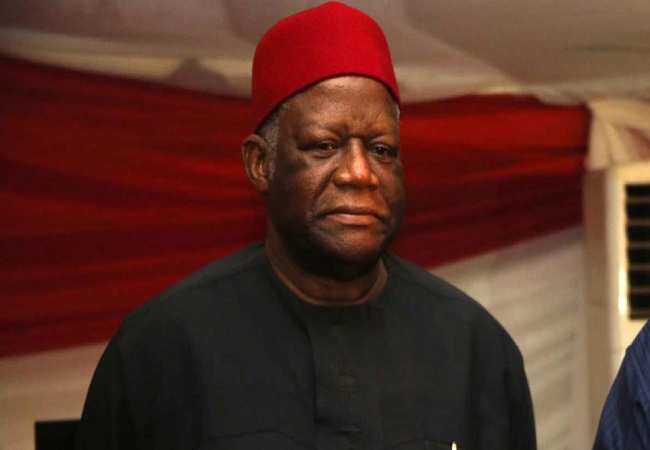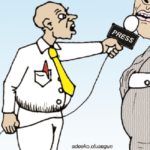AN old man’s bulging past casts a silent, scenic silhouette far into our present and future. The present, seeking sobering solace, runs into the sheltering shadow, wading through a thousand and one bits and pieces dropped by the receding ancient man. At 80, retired Major-General Ike Omar SandaNwachukwuis delivering precisely sucha refuge. It isan enclave he has constructed through a lifetime of momentous accomplishments, defeats, failures and successes.
Every year when this old soldier marks his natal anniversary, he urges his countrymen and women to examine his past so we all can be guided in our mortal struggle to attempt to rescue the land and build the beneficial society repeatedly denied Nigerians by their leaders. Nigeria’s military president Ibrahim Badamosi Babangida, IBB, was dreaming of just such a nation when he brought Nwachukwu, then a brigadier, from his duty as a provincial potentate in Imo State. In 1984, the preceding dictator, MuhammaduBuhari, had posted Nwachukwu there as the governor. But IBB saw what Buhari didn’t notice: 44-year-old Nwachukwu was stuff for the centre, for a larger national assignment.IBB gave the ‘federation’ a galactic cabinet to realize his vision.
Relieving Nwachukwu of his post as military governor, he added him to a team that had the likes of Kalu Idika Kalu, Rilwanu Lukman, Olikoye Ransome-Kuti, Tony Momoh, Emmanuel Emovon, Tonye Graham Douglas, AnthonyIkhazoboh etc. Nwachukwu was the proverbial recurring bad penny or ‘abiku’ who returned from death each time the mercurial IBB ‘executed’ his cabinet. He did so periodically in his eight-year dictatorship. Nwachukwu first appeared as Employment, Labour and Productivity Minister. Chroniclers have attributed to him the establishment, in 1986, of the National Directorate of Employment, NDE, which is among the few significant legacies of the IBB era.
It was Nwachukwu’s answer to the assault of the economic recession of the 80s. NDE tackled both the recession and the consequences of government’s Structural Adjustment Programme, SAP, that entailed the devaluation of the naira, among other macroeconomic policies. There were heavy job losses both in the public and private sectors. The Annual Report of NDE some years ago revealed alarming figures. Unemployment rose from 4.3% in 1985 to 7.0% at the beginning of 1987. It was a fatal surge that only a radical government initiative could tame. Ike Nwachukwu’s ministry saddled NDE with a mission: design and implement job creation programmes to promote attitudinal change, employment generation, reduce poverty and enhance wealth generation. NDE is still playing the role, more than three decades after a military junta introduced it. Recently when the federal authorities sought to empower the grassroots levels under a multibillion naira job placement scheme, NDE came up as the credible driver.
NDE has survived after 34 years in a country where the unwritten code is that institutions and their activities must be axed when governments that bring them into being are displaced. Even where the symbols of a past are laudable, they must give way. Largely, we have operated the country on sinking sand; there are no lasting structures to bear non-partisan testimony to an age gone by. So, is Nwachukwu lucky to have his ‘baby’ still alive and relevant, not guillotined in a nation notorious for a high mortality of its policies and legacies? It can’t be Mother Luck that has kept the hatchet man away. Many believe it is the inbuilt vision of the Directorate installed by the men and women Nwachukwu worked with in the ministry that has made NDE the irresistible bride of every government, military or civilian. Nwachukwu made it clear from the beginning that since unemployment is dynamic in society and would always remain with us, the agency itself would be for all seasons, coming up recurrently with innovations to address the challenges of each era.
The lesson from Ike Nwachukwu here is that you can leave imperishable legacies if you’re diligent or industrious in kitting them with vision to outlast your day. And if your concern isn’t personal glory. As Imo governor in 1984, Nwachukwu struck a similar feat with his relocation of Imo State University (now Abia State University) to Uturu, which has continued to be its permanent site. If you invest your service with a long throw into the future and not merely for today, you’re guaranteed a name in history. Nwachukwu was also twice Nigeria’s Minister of External Affairs, the first time from 1987 to 1989 when he was succeeded by Rilwanu Lukman, and the second time in 1990 till 1993 when Babangida’s creepily contentious contraption of a transition government brought in Matthew Mbu to take over from Nwachukwu.
The soldier in politics attracted piquant pillory in his era as Nigeria’s external relations point man. He fought a bitter ‘civil war’ with the staff of the Nigerian Institute of International Affairs, NIIA, as chairman of the Institute’s Governing Council. Next, with regard to Nigeria’s foreign policy, many charged him with pursuing a ‘mercantilist policy’, an economic theory that advocates government regulation of international trade to bring in wealth and strengthen national currency. It puts capitalists and government together to reduce trade deficit and create a surplus. On this score, Nwachukwu’s critics missed the point, even if we don’t deny their ideological fear as patriots that the pursuit of this theory could be manipulated by foreign capital to ensnare the country and weaken our bargaining power. The retired general understood the game better than his censorious opponents.
The world was in a state of flux. The mighty Soviet empire had collapsed. The vultures were waiting to prey on the carcasses and other collateral victims like Africa. Would the US and China, the remaining superpowers, move in for a new scramble for Africa? The only safeguard was to entrench your home economically. You needed some foreign ‘intervention’ in your dealings with the outside world. Nwachukwu didn’t tarry to take that route to sail his country above the troubled waters of the time. It seems this adroitness at striking for the expedient that made Ike Nwachukwu scale the heights in the military and politics was natural. He was born in Port Harcourt on September 1, 1940, to an Igbo father and a Fulani mother and brought to Yorubaland in Lagos to complete the making of a ‘tripod’ Nigerian personality. He is all of Nigeria’s major tribes (nations) put into one person. Later he would marry a non-Igbo and give his children names announcing his own multi-tribal parentage.
Ojewale lives in Lagos.
YOU SHOULD NOT MISS THESE HEADLINES FROM NIGERIAN TRIBUNE
Politician, Others Offended By My Husband Should Forgive Him ― Adedibu’s Widow
Wife of the late strongman of Oyo State politics Alhaji Lamidi Ariyibi Adedibu, Alhaja Modinat Abosede Adedibu has come out to appeal to those he offended while alive to forgive him, as there is no human being that does not make mistakes. She also added that since he is now late, those who offended him too…Ike Nwachukwu at 80 Ike Nwachukwu at 80
Kill Me Rather Than Destroy My Cannabis Farm ― Suspect Begs NDLEA In Kogi
A suspected Cannabis Sativa farmer, Clement Akor, has begged the National Drug Law Enforcement Agency (NDLEA) to take his life instead of destroying his 10-hectare cannabis plantation. Akor, a 42 years old father of six children from Enabo village in Ankpa Local Government Area of Kogi State was arrested by the Kogi State command of…Ike Nwachukwu at 80 Ike Nwachukwu at 80
CAMA Is Against Religious Institutions In Nigeria ―CUPP
The Coalition of United Political Parties (CUPP) on Wednesday said that the Companies and Allied Matters Act (CAMA) was being targeted at religious institutions in the country. Addressing newsmen in Abuja, the spokesman of CUPP, Ikenga Imo Ugochinyere said that it was also a plot by the Federal Government to have access to finance…Ike Nwachukwu at 80






